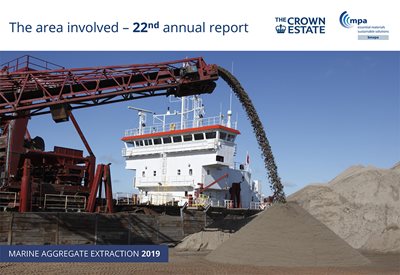The Crown Estate and the British Marine Aggregate Producers Association (BMAPA) have published the 22nd annual 'Area Involved' report, which details changes in the extent of the seabed area licensed and dredged for marine aggregates during 2019.
The full report can be accessed here: https://bmapa.org/documents/BMAPA_CE_22nd_Ann_Rep_2019.pdf
 The 'Area Involved' initiative began in March 1999, when BMAPA and The Crown Estate committed to reviewing all dredging licences on a rolling five-year basis, surrendering areas no longer containing economic resources of marine sand and gravel, and publishing an annual report detailing the extent of dredging activities within licensed areas.
The 'Area Involved' initiative began in March 1999, when BMAPA and The Crown Estate committed to reviewing all dredging licences on a rolling five-year basis, surrendering areas no longer containing economic resources of marine sand and gravel, and publishing an annual report detailing the extent of dredging activities within licensed areas.
Key information from the report includes:
- A total of 22 million tonnes of sand and gravel were dredged from Crown Estate licences in England and Wales during 2019 (compared to 20 million tonnes in 2018)
- The total area of seabed licensed in 2019 was 1,079km2 (1,102km2 in 2018)
- Dredging took place within 105 km2, 10 per cent of the licensed area, compared with 98km2 (9 per cent) in 2018
- The area of seabed dredged for more than 1 hour 15 minutes per year (high intensity – red on charts) was 6km2 (also 6km2 in 2018)
- 90 per cent of dredging effort from Crown Estate licences took place from an area of 42km2 (40km2 in 2018).
Nick Everington, Marine Minerals Portfolio Manager for The Crown Estate, said: “As manager of the seabed around England, Wales and Northern Ireland, we work in partnership with industry to help support the sustainable use of sand and gravel resources. The annual 'Area Involved' report is an integral part of this, helping to ensure our better understanding and management of the marine environment over the long term. This 22nd report reflects the ongoing commitment from both The Crown Estate and the industry to this important initiative and as such we welcome any comments or feedback on it."
Mark Russell, BMAPA Director, said: “UK Government has recognised that it is essential there is a sufficient supply of minerals to provide the housing, infrastructure, energy and goods that our nations need, and marine aggregate supplies play an important role in meeting these needs in England and Wales. The area of seabed licensed and dredged remain key indicators of the UK marine aggregate sector’s performance and its potential to interact with both the environment and other marine users. The significant reductions in both of these over the last two decades reflect an industry committed to continual improvement.”
Spatial and temporal data relating to the marine aggregate dredging activity have become increasingly important in supporting the sustainable management of UK waters. Both BMAPA and The Crown Estate are committed to maintaining and developing the Area Involved reporting initiative.
Marine aggregates provide over 20% of the sand and gravel demand in England and Wales, with the majority of supply used in high value ready-mixed concrete and concrete products. Certain regions are particularly reliant upon marine supplies. One third of all primary aggregate demand in London and the South East of England is met from marine resources, whilst in South Wales over 90% of the market demand for natural sand also comes from the sea.
Ends.
Notes to editor:
About BMAPA:
BMAPA is a constituent body of the Mineral Products Association.
About the Mineral Products Association:
The Mineral Products Association (MPA) is the trade association for the aggregates, asphalt, cement, concrete, dimension stone, lime, mortar and silica sand industries. With the affiliation of British Precast, the British Association of Reinforcement (BAR), Eurobitume, MPA Northern Ireland, MPA Scotland and the British Calcium Carbonate Federation, it has a growing membership of 520 companies and is the sectoral voice for mineral products. MPA membership is made up of the vast majority of independent SME quarrying companies throughout the UK, as well as the 9 major international and global companies. It covers 100% of UK cement and lime production, 90% of GB aggregates production, 95% of asphalt and over 70% of ready-mixed concrete and precast concrete production. In 2016, the industry supplied £18 billion worth of materials and services to the Economy. It is also the largest supplier to the construction industry, which had annual output valued at £169 billion in 2018. Industry production represents the largest materials flow in the UK economy and is also one of the largest manufacturing sectors. For more information visit: www.mineralproducts.org
For further information, please contact Robert McIlveen at robert.mcilveen@mineralproducts.org. Tel: 0207 963 8000.
About The Crown Estate:
The Crown Estate is a unique business with a distinct heritage and a portfolio unlike any other. It includes some of central London’s best places to work, shop and spend time, retail and leisure destinations across the country, and a substantial rural portfolio.
As manager of the seabed and half the foreshore around England, Wales and Northern Ireland, we play a role in the UK’s world-leading offshore wind sector as well as marine aggregates, cables and pipelines.
We are also responsible for the Windsor Estate, including the world‑renowned Windsor Great Park.
Our history can be traced back many hundreds of years. In 1961, the Crown Estate Act established us as an independent commercial business and tasked us with returning all our profit to the Treasury. Over the last ten years we have generated £2.8 billion for the benefit of the nation’s finances.
For further information, please contact The Crown Estate press office: 0845 241 2342/ pressoffice@thecrownestate.co.uk.